NJ plan to study social media impact on teens too slow to address crisis, advocates say
While the state's main stakeholders in public education have praised the creation of a new commission to assess and report in a year on the effects of social media usage on adolescents, some say a year is too long a wait to address an issue that has already claimed lives in New Jersey's schools.
Ample research literature, government advisories and whistleblower testimonies already point to social media's negative impacts on youth, they note.
Just last week, UNESCO, a United Nations body that looks at education, science and culture, recommended that smartphones should be banned in schools because they cause distraction and bullying.
Curriculum on how to protect themselves on social media
The state needs to create curriculum without delay to teach children how to protect themselves on social media, and one year is too long to wait, said Kara Alaimo, a Fairleigh Dickinson University expert on social media impacts on children and youth. It is "wonderful that the state is looking into this," she said, but "what I would also like to see happen is for the governor not to wait a year to implement social media curricula in schools."

It is "downright negligent" that students in New Jersey do not universally receive curricula of the same quality, Alaimo said. "If New Jersey schoolchildren were growing up in Finland, they would learn in school from the time they were learning how to read and write, how social media content affects their emotions, " she said. "We need these curricula now."
The state recognized the need to address social media in schools as far back as 2014, when only Facebook, Instagram and YouTube were the main players.
A Chris Christie-era law passed in January 2014 required the department of education to issue guidelines to teach middle-schoolers "social media behavior that ensures cyber safety, cyber security, and cyber ethics" and "potential negative consequences, including cyber bullying, of failing to use various social media platforms responsibly," in its technology standards. The old technology standards were renamed and recrafted as “Computer Science and Design Thinking,” under Gov. Phil Murphy.
Legal, safe and respectful use of social media in middle and high school is listed in the Murphy administration's 2020 health standards with an emphasis on safety from sexting and sextortion.
New Jersey's student learning standards are revised every five years.
Social media's impact on youth mental health
The state will use the new commission's report to craft policies for social media usage in school, but the law signed by Murphy last week has no funding appropriated with the bill, and does not specify what "effects of social media usage" it is looking to identify that are not already listed in research conducted in 2022 by the Pew Research Center and highlighted in recent advisories issued by U.S. Surgeon General Vivek Murthy and the American Psychological Association.
Research has not determined the impacts of heavy social media use by adolescents, and though it has many benefits, its constant and near-all day use is alarming and could impact the still-forming brains of adolescents, say experts from the APA. Social media is a driver of the youth mental health crisis, says Murthy.
More: When your child is the bully: A NJ psychologist says watch for these warning signs
More: How social media is transforming teens' ideas about sex may surprise you
The new 19-member commission will have 14 representatives from these organizations and five outside experts selected by lawmakers. It will furnish a report that lists social media effects, list usage standards as to how much time kids can spend on social media during the school day and propose strategies to manage their impact on kids.
"The purpose of this commission is to direct stakeholders with lived experience and/or expertise in the commission’s areas of study to determine the mental, physical, and academic impacts of social media usage on New Jersey students," said Christi Peace, a spokesperson for Murphy's office. "State actions will be determined following receipt and review of the commission’s recommendations in their final report."
Despite being slow to address social media literacy in schools, New Jersey has been a forerunner in addressing other curricular needs that have to do with the current media landscape. A January law requires the state Department of Education to devise classroom learning standards on media literacy to identify disinformation and discern "fact from fiction."
Bullying on social media
The law creating the commission was signed the same week that the family of Mallory Grossman won $9.1 million in a settlement agreed upon by Rockaway Township School District in Morris County in a bullying case. Grossman, who was 12, died by suicide in 2017 after relentless bullying, much of it online.

And in February, 14-year-old Adriana Kuch took her life after being bullied in school and on social media at Central Regional High School in Bayville, in Ocean County.
With no clear guidance from the state or federal departments of education in the decade or so since social media usage became common in and out of schools, some New Jersey districts have taken matters into their own hands.
More: Is it bullying? Frustrated NJ parents often enter murky waters when school says it's not
More: Why your parenting style won't work with digital kids: Tips from NJ mental health experts
Two federal lawsuits filed by the School District of the Chathams in Morris County and Watching Hills Regional High in Somerset County accuse Facebook, Instagram, Snapchat, TikTok and YouTube of public nuisance and negligence, and are seeking financial and injunctive relief.
The lawsuits, filed earlier this year, detail testimonies and interviews of executives and whistleblowers at social media companies in which they openly discussed their goal to increase engagement and attention using constantly evolving algorithms that are designed to addict users by creating dopamine hits to users’ brains.

Increased spending on mental health services
The Chathams and other public schools say that school-aged students suffer some of the worst impacts and this is felt in the increasing expenditure on counseling and mental health services the schools provide.
"But for social media companies causing harm to our children's mental health, boards of education would not have to spend money it is spending on mental health and counseling. That money can go toward classroom education, for instance," said Michael Innes, an attorney at Carella Byrne, the Roseland-based firm representing the two districts.
Hundreds of other districts across the nation are filing similar cases, including more expected from New Jersey. Those cases were transferred to the U.S. District Court for the Northern District of California, where they will be treated as one in federal court, Innes said.
The lawsuits are asking for money in damages, but also for changes to the tech companies' business practices and algorithms to protect children rather than addict them.
More research needed
The text of the law creating the new commission in New Jersey does not mention key resources available from state entities that might overlap with the commission's work.
A deep dive into effects of media requires a "multi-tier" effort and "significant resources to research that can help us better understand the intricacies of the issue," said Germán Cadenas, associate director of the Center for Youth Social Emotional Wellness at Rutgers University.
Research is needed to determine what specific parts of social media may be harmful for youth, what parts are helpful and protective and how educators, mental providers and parents or caregivers can adapt and adjust to support the well-being of youth in this context, he said.
"I think that there is room for New Jersey to collaborate with national experts, and also to make use of the expertise that exists in its premiere universities, such as Rutgers," he said.
This article originally appeared on NorthJersey.com: NJ social media study on impact on teens criticized by some

